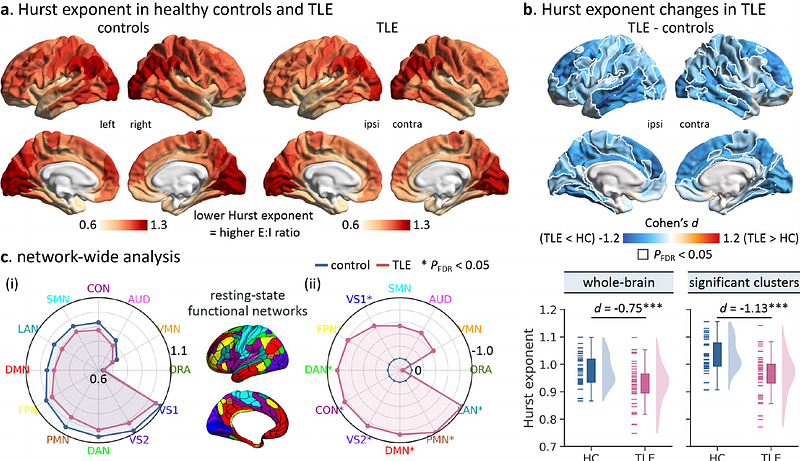Pharmaco-resistant temporal lobe epilepsy gradually perturbs the cortex-wide excitation-inhibition balance

Pharmaco-resistant temporal lobe epilepsy gradually perturbs the cortex-wide excitation-inhibition balance
Xie, K.; Royer, J.; Rodriguez-Cruces, R.; Horwood, L.; Ngo, A.; Arafat, T.; Auer, H.; Sahlas, E.; Chen, J.; Zhou, Y.; Valk, S. L.; Hong, S.-J.; Frauscher, B.; Pana, R.; Bernasconi, A.; Bernasconi, N.; Concha, L.; Bernhardt, B. C.
AbstractExcitation-inhibition (E/I) imbalance is theorized as a key mechanism in the pathophysiology of epilepsy, with a mounting body of previous research focusing on elucidating its cellular manifestations. However, there are limited studies into E/I imbalance at macroscale and its microcircuit-level mechanisms and clinical associations. In our current work, we computed the Hurst exponent--a previously validated index of the E/I ratio--from resting-state fMRI time series, and simulated microcircuit parameters using biophysical computational models. We found a broad reduction in the Hurst exponent in pharmaco-resistant temporal lobe epilepsy (TLE), indicative of a shift towards more excitable network dynamics. Connectome decoders pointed to temporolimbic and frontocentral areas as plausible network epicenters of E/I imbalance. Computational simulations further revealed that enhancing cortical excitability in patients likely reflected atypical increases in recurrent connection strength of local neuronal ensembles. Moreover, mixed cross-sectional and longitudinal analyses revealed heightened E/I elevation in patients with longer disease duration, more frequent electroclinical seizures and inter-ictal epileptic spikes, and worse cognitive functioning. Replicated in an independent dataset, our work provides compelling in-vivo evidence of a macroscale shift in E/I balance in TLE patients that undergoes progressive changes and underpins cognitive impairments, potentially informing treatment strategies targeting E/I mechanisms.
